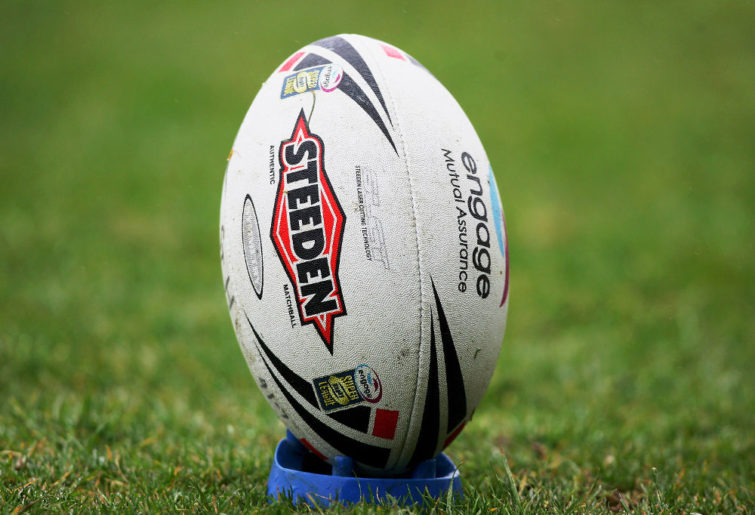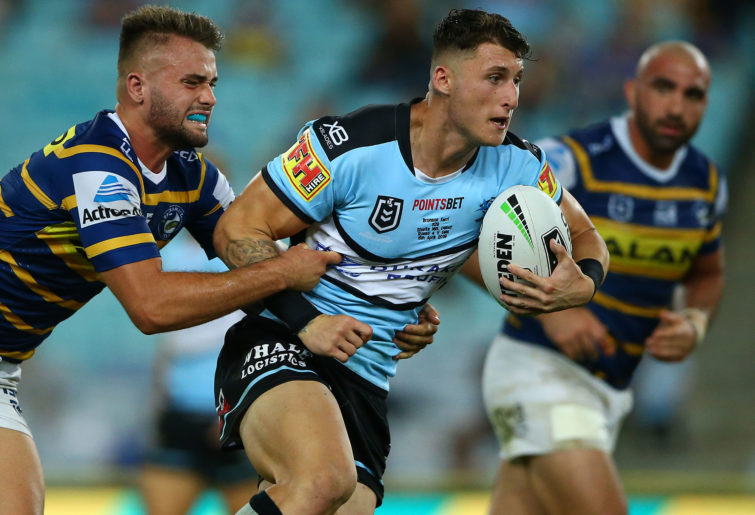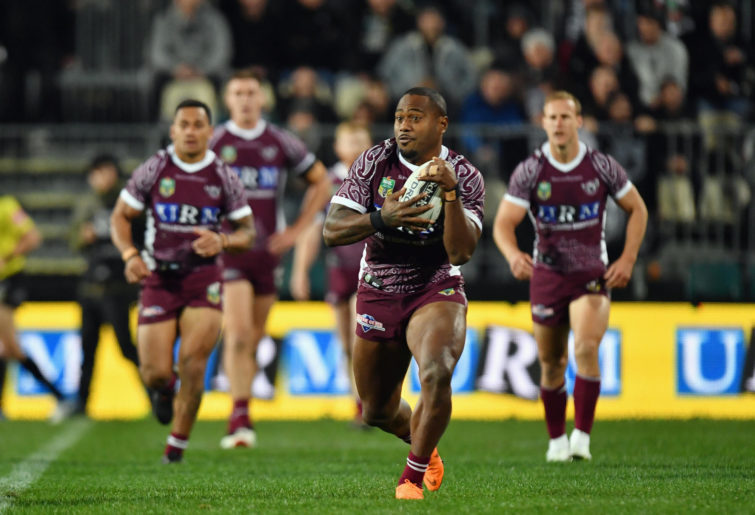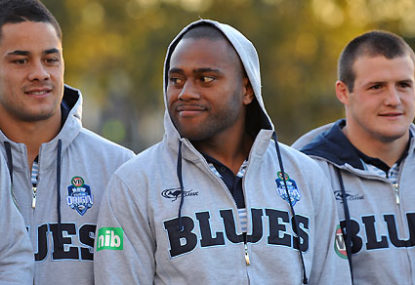And now in our search for the winner of the mythical Alphabet Cup we come to the last of the alphabet teams: the combined UXZ Super Group.
Okay, so maybe it’s not that super, but I managed to avoid having to source overseas players, so that’s a positive. They have some power and pace in the backline.
Click here to see previous articles in the series.
1. William Zillman (captain)
Years active: 2006–17
Clubs: Canberra, Gold Coast
Club games: 180 (54 tries, 1 field goal)
After playing rugby union for the Australian Schoolboys in 2003 William Zillman burst onto the league scene, tearing the lower grades apart and being selected for the under-19s Queensland side and the Junior Kangaroos in 2005.
But his debut in 2006 couldn’t have been worse from a team point of view, with the fullback watching helplessly as his teammates let Newcastle waltz through them, conceding 70 points. Zillman did score two tries on debut in that game, but it was only a small consolation. He played only another two games that season as Clinton Schifcofske won the Dally M fullback of the year for 2006. Zillman continued to dominate the lower levels scoring 17 tries in the Premier League.
He was the first-choice fullback for 2007 and scored a hat-trick of tries in Round 3, only his sixth first-grade game. The future seemed bright, but then Zillman suffered serious knee injuries in 2007 and again in 2008.
Zillman joined the Titans in 2009 and enjoyed a successful career with the club, playing over 150 games in nine seasons and captaining them during their 2016 finals campaign. After four relatively injury-free years, however, Zillman never managed to play 20 games in any of his last five seasons.
Post-retirement, Zillman has moved into horse training and veterinary medicine.
2. Jack Upton (goalkicker)
Years active: 1927–36
Clubs: Souths Toowoomba (Queensland)
Representative games: 34 (26 tries, 34 goals)
Representative career: Tests: 1, Queensland: 25.
Jack Upton was a star fullback or winger for the Toowoomba and Queensland sides in the 1920s and 1930s, just after the end of a period of Queensland dominance. He was selected for the 1929 Kangaroo tour and played one Test against Wales, scoring two tries from centre.
However for the Ashes Tests he could not displace the first-choice three-quarter line of Frank McMillan (Wests Sydney), Bill Spencer (Bundaberg, Queensland), Cec Fifield (Wests Sydney), Tom Gorman (Brothers Brisbane) and Bill Shankland (Easts Sydney). Upton played 19 games on tour, scoring ten tries and kicking four goals.
Upton also played two games for the Kangaroos against the ‘Rest of Australia’ in 1930 on return from England, scoring a try and kicking eight goals in the two victories.
Upton played 16 times for Queensland against New South Wales. After a one-off appearance in 1927, Upton played in four series between 1929 and 1932, winning two and scoring 13 tries and kicking 14 goals. This included a hat-trick in his final game, winning the deciding third match of the 1932 series, Queensland’s last series win until 1940.
Upton also played six tour matches for Queensland against country New South Wales sides, as was the custom in the era. In 1930 Upton played in Queensland’s two wins over the touring New Zealand side and in 1932 played in their loss to England. Overall, he played 25 times for his state, scoring 19 tries.
Upton represented Toowoomba six times over ten years against touring New South Wales and English sides. While no longer the all-conquering force they once were, the Clydesdales held their own, defeating New South Wales in 1928, holding England to a draw in 1932 and suffering narrow losses to the tourists in 1928 and 1936. In the Bulimba Cup annual competition between Toowoomba, Ipswich and Brisbane, Upton was a three-time winner with the Toowoomba side.
As per the Brisbane Courier in 1929, Upton was described as, “A safe catch, a good punt, and stab kick, and Is a very tricky and elusive runner, having scored tries against many teams of note”.
Upton was nominated at fullback for the Toowoomba and South West team of the century, losing out to Darren Lockyer.

(Matthew Lewis/Getty Images)
3. Matt Utai
Years active: 2002=13
Clubs: Canterbury, Western Suburbs
Club games: 167 (85 tries)
Representative career: Tests: 4 (NZ), 3 (Samoa)
Matt Utai had a long and successful career with the Bulldogs and Tigers. He flew onto the scene in 2002 and was named the Dally M rookie of the year, and he scored a try on debut for New Zealand against Australia. His season was soured by the dominant Bulldogs being stripped of their competition points for salary cap breaches.
In his first three years Utai was a low-to-the-ground, charging powerhouse, scoring 50 tries in 67 games for the Bulldogs, including an amazing run of hat-tricks in three consecutive games in 2003. He played for New Zealand three times in this period, including a draw against Australia in the 2004 tri-series. This period culminated in Utai scoring a double in the Bulldogs’ 2004 grand final victory.
Utai’s career never again reached those heights as injuries and form fluctuations took their toll. He played only 20 games in a season twice in the next eight years. After leaving the Bulldogs in 2009 and spending a year in the lower tier, winning a premiership with the Auburn Warriors, Utai returned to provide some experience for the Wests Tigers over the next three years.
Utai represented Samoa in the 2008 World Cup, scoring two tries as they won two of their three pool games but missed out on the finals on for and against.
In 2017 Utai was still kicking around, playing for the Auburn Warriors in the Ron Massey Cup as they made the grand final.
4. Bronson Xerri
Years active: 2019 – present
Club: Cronulla
Club games (to 27 July): 15 (eight tries)
Despite the line-up of absolute superstars in this team, Bronson Xerri has forced his way in. The boom teenager has been a sensation for the Sharks this season since his debut in Round 4. In his first 15 games Xerri has managed eight tries, nine line breaks, 58 tackle breaks and four try assists, averaging nearly 120 run metres per game. This included a whopping five tries in only two games as the sharks beat the dragons and Eels in rounds 11 and 13.
With a top speed recorded this year of 34.5 kilometres per hour, Xerri is in the top ten fastest players in the game.
Xerri’s rise left veterans Josh Dugan and josh Morris playing on the wings, which apparently did not go down too well. Playing first grade obviously means a lot to the youngster, as shown by a video of the moment he was told by his coach that he would be making his debut earlier this year.
Family is pretty important to the youngster. On his debut he asked the club for 50 tickets for his extended clan. Xerri’s older brother Dylan was also a promising outside back for the sharks lower grades until serious ankle injuries forced his premature retirement.
He doesn’t even turn 19 until September.

(Matt Blyth/Getty Images)
5. Akuila Uate
Honours: Dally M winger of the year 2010 to 2012.
Years active: 2008 – present
Clubs: Newcastle, Manly, Huddersfield (UK)
Club games (to 2018): 201 (130 tries)
Representative career: Tests: 5 (Aus), 18 (Fiji). New South Wales: 5.
Nickname: Akuila the Thriller
For a three-year golden period Akuila Uate was the finest winger in the game. From 2010 to 2012 Uate scored 66 tries in 82 matches for Newcastle, Country, New South Wales and Australia and was named Dally M winger of the year for three years running. He was the competition’s top try-scorer in 2010 and 2011 and missed out by two tries in 2012 of becoming just the second player after Nathan Blacklock to score 20 tries for three consecutive years.
While his form never again reached those heights, Uate finished his NRL career with 129 tries in 200 games before moving to the UK in 2019. He holds the record for the most career tries for Newcastle.
Uate played for Fiji in the 2008 World Cup, scoring a hat-trick on debut against France as the Bati made it to the semi-finals before falling to Australia. That year also saw him debut for the Knights in Round 19, and he scored three tries in his first two games. By 2011 he was representing New South Wales in State of Origin, playing five games in a row across 2011 and 2012.
Uate debuted for Australia in the Four Nations that year, scoring a double against New Zealand in his first game and playing all four games in the tournament.
After missing out on Australian selection he against represented Fiji in the 2013 World Cup and again scored a hat-trick in the opening game. The team again made the semi-finals before (again) losing to Australia.
Uate moved from Newcastle to Manly in 2017 after being dropped to reserve grade. Through 2017 and 2018 he scored 19 tries in 39 games for the Sea Eagles.
In 2017 Uate played in his third World Cup for Fiji. He scored in the team’s opening match for the third tournament in a row. Fiji upset New Zealand in the quarter-finals for their first victory over a tier-one nation before losing a semi final to Australia for the third consecutive time.
Andrew Johns said in the Daily Telegraph, “In all my years in rugby league I’ve never seen a better athlete than this bloke”.

(Kai Schwoerer/Getty Images)
6. Scott Zahra
Years active: 1997-98
Clubs: Gold Coast
Club games: 6
I’m a bit short of halves options. Scott Zahra played six games for the Gold Coast across 1997 and 1998 for two wins. He was a former Queensland Schoolboys representative and Australian Schoolboys shadow player. At just 26 his career was cut short by a ruptured disc in his back.
After retirement Zahra has remained in rugby league. He spent some time coaching juniors for the Southport Tigers, then under-18s for the Hervey Bay Seagulls and is a game development officer for the NRL on the Queensland Fraser Coast.
7. Maurice Unwin
Years active: 1922-25
Clubs: University
Club games: 24 (one try)
This was a tough pick. I had two available halfbacks to choose from that won a grand total of three premiership games between them from 51 starts. Maurice Unwin gets the nod because he won two of them.
Unwin played for the University team in the 1920s. The team was spectacularly unsuccessful and only lasted from 1920 to 1937. In 1924 Unwin also played halfback for a Universities XIII against the touring British, losing 31-23.
The University club had their moment in the sun in 1924 when they beat Eastern Suburbs to make the final of the City Cup, a knockout competition that ran at the time, before losing to South Sydney by 23 to 2 in the final.
8. Lew Zivanovic
Years active: 1979-86
Clubs: Penrith
Club games: 116 (5 tries)
Nickname: Lubo.
There has been a colourful and controversial life post-football, but before that there was 116 games for the Panthers across eight seasons. It was a largely unsuccessful era for the ‘chocolate soldiers’, but they did scrape into the finals in 1985, the first Panthers side to do so, defeating Manly in a playoff for fifth place.
Penrith had hit rock bottom during Zivanovic’s time until Tim Sheens was appointed coach in 1984. From The Mole on Facebook: “Penrith were almost bankrupt and had no players. It was January and Tim called a meeting of all the contracted players. So we all got together – there were five of us!”.
Zivanovic was a wholehearted performer and racked up a lot of tackles before retiring to become a full-time millionaire.
Zivanovic was born in a refugee camp in Italy as his parents made their way to Australia. He was put in an orphanage when he was five. It was a remarkable rise to professional footballer and property magnate.
9. Sione Utia-Katoa
Years active: 2015 – present
Clubs: Penrith
Club games (to 2018): 33
Representative career: Tests: 9 (Tonga).
Sione Utia-Katoa, not to be confused with the Cronulla winger, debuted late in 2015 for Penrith but had to wait until halfway through 2017 to cement his spot in the side. He moved from the bench to starting hooker in 2018 as Penrith reached the preliminary final.
Katoa was selected for the strong Tongan team for the 2017 World Cup. He played in five matches, including the club’s historic win over New Zealand and their two-point semi-final loss to England.
Katoa is a bit of an angry ant, as per the NRL website: “Gus said to me ‘we can’t have you playing the season from the sidelines, clean up your game”.
Up to the end of Round 12 of 2019 Utia-Katoa has yet to score a single point at either first grade or international level in his 55 games.
10. Braden Uele
Years active: 2017 – present
Clubs: North Queensland, Cronulla
Club games (to July 2019): 16
Nickname: Brades
His name is strictly speaking Braden Hamlin-Uele, but what the heck, the UXZs had already claimed him in an a classic ‘Inglis’ manoeuvre, so here he stays.
(Hamlin-)Uele is just starting his professional football career. He played for the Sydney Roosters in the National Youth Competition in 2013 and represented the Junior Kiwis the following year. After switching to North Queensland he continued in the youth competition and again turned out for the Junior Kiwis.
In 2016 Uele played for the Mackay Cutters in the Intrust Super Cup. He made his first grade debut in Round 21 of 2017 in the Cowboy’s loss to the Sydney Roosters.
In 2018 Uele joined Cronulla and played on the bench in their Round 10 win over Canberra. He spent most of his season with the Newtown Jets in the Intrust Super Cup, where they finished runners-up.
The 2019 season has been Uele’s breakout season, with 14 appearances from the bench to 27 July. He has scored three tries and has averaged a tick of 100 running metres per match. It looks like Uele will cement his position in the UXZ team for years to come.
11. Paul Upfield
Years active: 1984-91
Clubs: Illawarra, St George, Balmain
Club games: 88 (10 tries, 1 goal)
Paul Upfield had a great surname for rugby league. The journeyman played 88 games over eight seasons for four clubs. The most productive phase of his career was in his first five years at the Illawarra Steelers, where Upfield played 76 games. He mainly played second row but filled in at fullback and centre. In 1988 Upfield moved to five-eighth, playing a full season there. The Steelers never made the finals during his time at the club.
In 1988 Upfield was selected on the bench for New South Wales Country in their two-point loss to City.
Upfield moved to St George in 1999 but played only five first-grade games. The following two years saw him at Balmain but again his first-grade appearances were limited.
Following his departure from Balmain, Upfield played for Wagga Kangaroos and the Nowra Warriors. In 1994 he captain-coached Bathurst to a Group 10 premiership before returning to the Illawarra competition as a representative captain-coach
12. Mark Zillman
Years active: 1978 -87
Clubs: Fortitude Valley (Queensland), Wynnum Manly (Queensland), Ipswich (Queensland)
Father of fullback William, Mark Zillman was a no-frills second rower and prop who was a stalwart of the Brisbane rugby league competition in the 1980s.
Zillman debuted for Valleys in 1978 in the same AMCO Cup match against Illawarra that also saw the debut of another fairly handy player by the name of Wally Lewis. Zillman played in the club’s 1978 grand final loss to Easts before moving to Wynnum Manly in 1981, appearing in the preliminary final that year.
He was part of the Wynnum-Manly side that won the 1982 grand final, the club’s first ever premiership, in front of 36,000 fans at Lang Park. That side included players such as Rod Morris, Gene Miles and Colin Scott. After few more years at Wynnum, where he was in and out of a star-studded first-grade side that won a further two premierships and four straight state league titles, Zillman joined the Ipswich Jets in 1987 for their first season in the BRL and captained a side containing youngsters Alan Langer and Kevin and Kerrod Walters.
13. Rod Urquhart
Years active: 1970-74
Clubs: Souths, Cronulla
Club games: 51 (seven tries)
Hailing from Gosford, Rod Urquhart played for New South Wales Country before spending two seasons with the Sharks. A highlight was scoring a try in 1971 in a win against the premiers Souths in the Shark’s first ever ‘match of the day’ at the SCG.
Urquhart left to play a season for Wests Illawarra and represented Country Seconds along with a young Mick Cronin before returning to Sydney with Souths for a further two years. Urquhart also played for Boggabri and the Nambucca Roosters in an extensive country career.
Bench
14. Anthony Xuereb
Penrith, Wests; 1991-94
Fullback. Had to get a spot as the only ‘X’ on the roster pre-Xerri. He played off the bench in the Panthers 1991 semi-final victory but missed a spot in the team for the grand final. Played for Malta in 2005 more than a decade after retiring in a two-point victory over Greece.
15. Ernie Usher
Annandale; 1918-20
Halfback. He played 27 games across three years for The Dales, the least successful team by winning percentage in New South Wales rugby league history, for one win. He scored a try in a draw against Souths and could kick goals.
16. L Upton
Toowoomba (Queensland); 1921 (approx.)
Hooker. Was a member of the 1921 Toowoomba team captained by the great Tom Gorman that beat the touring New Zealand side 30-18. Upton scored a try in the match – the only report I can find, in the Brisbane Courier of 23 June 1921, simply says, “The Toowoomba forwards once again carried play into the New Zealand half. Upton gathered, and ran through unhindered.”. The gate takings for the match were a whopping £139. “This evening the players were entertained at a jazz party by the Toowoomba rugby league.” Upton also toured North Queensland with the Toowoomba team that year.
17. Nick Zisti
Years active: 1991-99
Clubs: South Sydney, St George, Hunter Mariners, Cronulla, Bradford (UK)
Club games: 81 (30 tries, 20 goals)
Zisti gets a longer write-up having lost his place in the starting line-up at the very last minute to Bronson Xerri.
Nick Zisti was a journeyman winger or centre in the 1990s. After failing to cement a first-grade spot with Souths over four seasons – he ruptured his ACL on debut in 1991 and was out for a year – his highlight was probably scoring the only try for the Dragons in their 1996 grand final loss to Manly. Zisti signed with Super League and spent the 1997 season with the doomed Hunter Mariners, topping their try-scoring and pointscoring lists.
Short stints with Cronulla and the Bradford Bulls followed. Overall Zisti played 81 first grade games, scoring 30 tries.
In 1999 Zisti moved to rugby union and used his heritage to represent Italy. He played for Italy four times and won the Italian rugby union premiership in 2000 with Rugby Roma Olimpic. Amazingly his Test debut against England was his first professional rugby union game. From the Daily Telegraph: “I felt like I was running around like a headless chook. I didn’t know what I was doing,”
His second professional game was marking Jonah Lomu against the All Blacks. “Unbelievable, they just killed us. They put a hundred points on us. All I can remember is running back and forth trying to cover tackle. I saved a couple of tries, I remember I tackled Jonah once. I’ve never seen a more phenomenal athlete than Jonah live. He was incredible.”
Honourable mentions
Etuate Uaisele (wing, Eels; eight Tests for Tonga and 30 club games).
And there you have Team UXZ. The three quarters have some pace and tackle-breaking ability, but the forwards are honest at best and we are seriously short of halves.
For those few hardy souls who have joined me this season, there are three more articles to go.
Because of U, X and Z not fielding their own teams, next time I will list two ‘best of the rest’ teams of players most unlucky to miss out on their main squads.
Then we have to acknowledge the coaches who will prepare these virtual teams and list a coach and two assistants for each letter.
Finally, in the last week we will count down our 26 teams to see who wins the mythical Alphabet Cup.
































































































